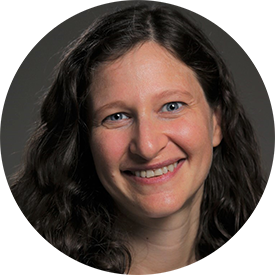
This week's Faculty Spotlight shines on Rebecca Sadun, MD, PhD, assistant professor of medicine and pediatrics in the Division of Rheumatology. Sadun discusses how she became interested in adult and pediatric rheumatology in medical school when she became intrigued by data showing that children with chronic conditions are at high risk for disease flares during adolescence, primarily for psychosocial reasons. She knew early on that she wanted to pursue MedPeds training in order to help adolescents and young adults through the challenging times of transition from pediatric to adult care. Notably, she has worked in conjunction with the Department of Family Medicine in developing a Young Adult Rheumatology Clinic to assist lupus and other complex patients with transition to adult care.
How long have you been at Duke? How did you decide to come here?
I’ve been at Duke just shy of 10 years--first as a MedPeds resident, then as an adult and pediatric rheumatology fellow, and currently as faculty with a joint appointment in the Departments of Medicine and Pediatrics, with my time divided equally between the two Divisions of Rheumatology. I came to Duke because I wanted to be a combined adult and pediatric rheumatologist: Duke not only has a phenomenal MedPeds program (in large part due to such strong categorical residency programs on both sides), but has also trained more adult and pediatric rheumatologists than any other institution.
What are your responsibilities within the Division of Rheumatology? What does a typical day for you look like?
I am currently 80% research and 20% clinical (divided equally between pediatric rheumatology and adult rheumatology), and in July, I became the Associate Program Director for the Pediatric Rheumatology Fellowship. The only thing “typical” about a day for me at this point is my hustling between three offices in three different buildings.
What made you decide to pursue adult and pediatric medicine, and rheumatology in particular?
In medical school I became intrigued by data showing that children with chronic conditions are at high risk for disease flares during adolescence, for reasons that are psychosocial more so than biological. Patients are also extremely vulnerable when it comes time for them to transfer from pediatric to adult care. I knew early on that I wanted to pursue MedPeds training in order to help adolescents and young adults through these challenging transitions. Rheumatology appealed to me because of my interests in immunology and autoimmunity--and chronic rheumatic diseases are an ideal arena in which to offer longitudinal care and the psychosocial support needed to help adolescents and young adults learn how to succeed in the adult healthcare system.
What’s one thing you wished more of your patients knew about transition?
Learning self-management skills is a little like learning how to drive: You can’t just read the DMV book and be ready overnight--you need practice behind the wheel. Young adults are most successful when they and their parents are deliberate about having them get experience in the driver’s seat, practicing the key skills. . .but with a parent at arm’s reach to watch and lend assistance when needed.
What’s one thing you wished more of your patients knew about rheumatology?
Our field is replete with zebras and grey-zones--sometimes grey zebras. It’s common for us not to be able to give a definitive name to a patient’s symptoms.
What are your specific interests in the field of rheumatology?
I really enjoy working with adolescent and young adult lupus patients. To assist lupus and other complex patients with transition to adult care, I have developed a Young Adult Rheumatology Clinic in collaboration with the Department of Family Medicine. This clinic provides medically and socially complex young adults with integrated primary care, subspecialty care, and social work care, as well as an element of case management between clinic visits.
Is there any research you are doing or plan on doing?
My research is focused in two areas: In a collaboration with Dr. Garnett Kelsoe from the Department of Immunology, I am conducting translational research that is investigating differences in B cell biology between pediatric-onset and adult-onset lupus, specifically examining autoreactive B cell populations. In addition, I am doing medical education research related to how best to teach trainees how to help young adults prepare for a successful transition and transfer from pediatric to adult care.
What passions or hobbies do you have outside of work?
My time outside of work is currently consumed by trying to teach my 4-year-old daughter not to touch her face or otherwise acquire and transmit coronavirus SARS-CoV-2.